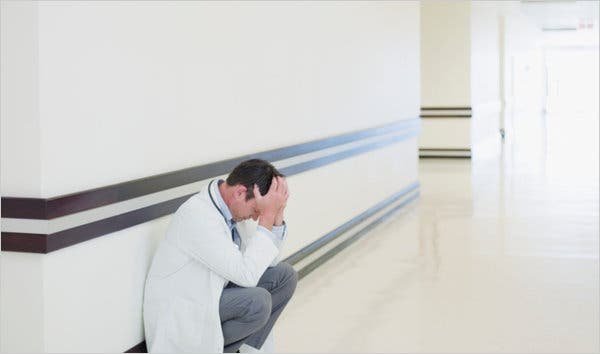“ The Indian Journal of Psychiatry states that 30% of Doctors suffer from depression at some point in their lives “
Yes, the very doctors we seek to cure our physical and mental problems are the ones that are at risk of Depression.
If you find this fact staggering, you should take a look at the fact below.
The Same Indian Journal of Psychiatry also states that 17% of Doctors and Medical Professionals have thought about ending their lives at some point in time.
It may sound shocking, but it is true. This is caused by the immense stress these medical professionals go through every single day. The High Doctor: Patient ratios in India, paves the way for a highly stressful work environment for medical professionals in our country.
Why will India need more doctors in the future?
While the current number of doctors is too low to look after patients, a lot of us have thought that the coming years will be great for the medical community. But tragically, the future does not look good either. The World Health Organization ( WHO ) states that India has 7 doctors for 10,000 people.
Do the math right and you will find that there isn’t even a single doctor for a 1000 people in the country. The Average count of doctor: people ratio is a shocking 1: 1428.
The research also states another interesting yet disturbing fact. Even with the good number of medical colleges and students opting to become medical professionals, India will take a lot more years to achieve the 1: 1000 of Doctor: Patient ratio.
The calculated facts state that India needs at least until 2030 to achieve this ratio. But by then the estimated level of the Indian population would rise from 1.239 billion to 1.476 billion. The simple solution is that we need more doctors and better resources we need to give them improved working conditions.
Why are Doctors at Risk of Depression?
Depression is a mental condition that negatively alters the way of life, causing a feeling of sadness. It can spring up due to a number of reasons, but a highly stressful life is one of the major reasons people fall into depression.
Doctors lead a stressful life and when they fail to implement proper stress management techniques, they sometimes end up finding depression at their doorsteps.
Reason for doctor falling into depression
Untimely work shifts
Irregular sleep patterns
Lack of support and empathy from superiors
Loneliness in the workplace
Failing to strike a balance between personal and professional life
The sudden death of a patient
And a number of other small reasons that add up over time.
Why do Doctors refrain from sharing their problems with the Community?
Doctors are health advocates and when they claim that they are affected, they simply lose their credibility. Even worse is that Depression can put doctors at risk of losing their rights to professional practice.
Yes, doctors defer from telling their peers and colleagues that they suffer from depression. This is because of licensing boards that prevent depressed and mentally unstable doctors from carrying on with their practice.
The Medical Boards in India always make sure that the patients are safe in the hands of their doctors. Suffering from a mental illness or depression makes a doctor unfit for medical practice.
The type of doctors that are at risk of getting depressed
trauma surgeons
Emergency care doctors
vascular surgeons
general surgeons
The specializations of a medical professional put them in a state where they have no people to relate to. There is also a pressure to make Life-Saving decisions in their practice adding to the stressors of life. When these professionals fail to allocate their time to take care of their mental health, falling into a cycle of depression seems inevitable.
Are Junior Doctors safe from these pitfalls?
If you consider junior doctors and early medical professionals to be safe from depression, you need to think again. Junior Doctors are at more risk of suffering from depression due to another set of reasons.
Errors with prescription
Humane Errors while taking care of patients
Losing patience with patients/caregivers
Inability to communicate with patients.
Lack of empathy and understanding from seniors.
Let’s Take a Look at the case study from a Tertiary care Hospital in North India
This Live study was implemented to serve as proof for the claims of increasing psychological disorders and burnout among medical professionals.
An online survey was forwarded to the 1721 doctors and hospital staff. A total of 445 professionals responded to the online survey and the results were quite shocking
Here are the test results of this online survey.
30.1% of Professionals were reported to have depression or experienced it in the past
16.7% of professionals had suicidal thoughts in the past
And a whopping 90% of them were evidently burnout
This proves that Doctors are going through extreme sets of depression and other mental health problems. We need to act quickly and fiercely to put in measures that will save the people who save us.
Jai Hind
Vivek




